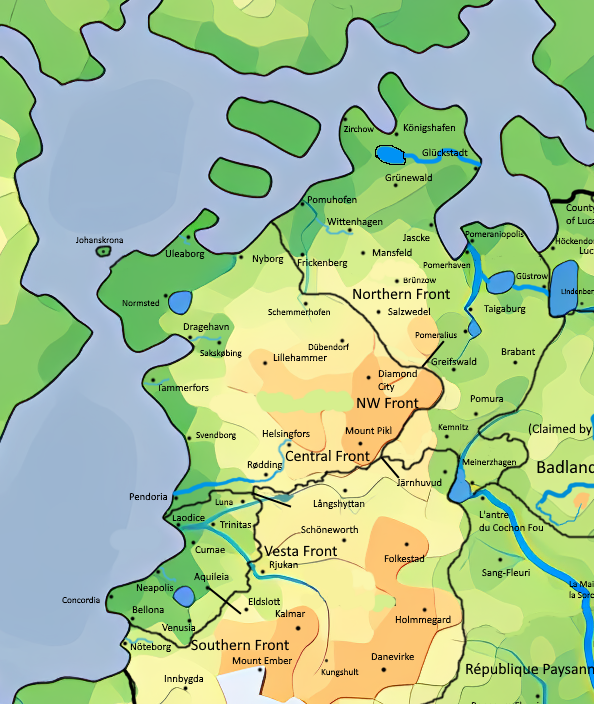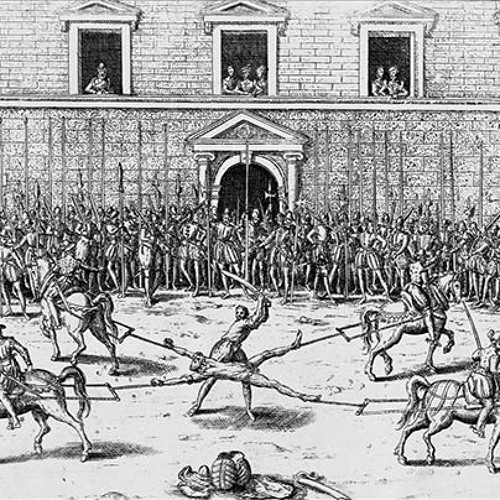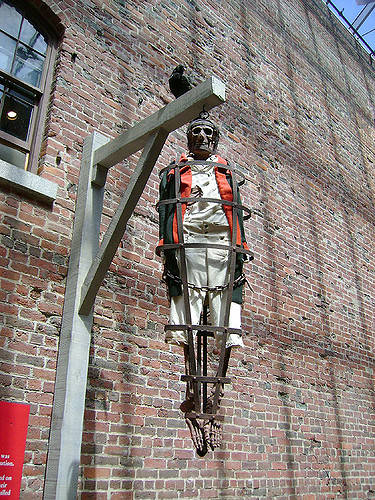Chapter XXXVII: Spring Operations in Vesta Front
Late-March to Late-May 1112 VTE

Detailing of the "Fronts"
Notes: The "Vesta Front" as historians have come to know it is the lands between the cities of Aquileia in the South and Luna in the North. For easy of understanding for readers, the Southern Front is operations from Aquileia to Bellona, the Central Front stretches along the border of Selenium and Eliria, the Northwestern Front encompasses lands between the Duchy of Pomura and the Principality of Salzwedel, and the Northern Front lands front Salzwedel to Nyborg. These fronts will change in names and locations over time thanks to the progress of the war and will be updated for the reader. Furthermore, all content will be separated by these fronts unless they overlap to avoid confusion and clutter.
As disaster struck the Allies in the North, the March Thaw signaled the beginning of operations in all other fronts, including the Vesta Front. For Magnus, the Vesta Front was the most important area over the war strategically, as victory in this front would likely mean the collapse of the Grand Principality of Syrenia and would lead to ultimate victory no matter what his allies were doing in Eliria. His goals for this year, as stated previously was to capture both Cumae and Laodice and destroying Cato's Army. If nothing more, capturing the Vesta itself would lead to the destruction of Cato's army in the process.
Unfortunately for Magnus, awful weather in March postponed his attack until April 2nd, time he wasn't keen on wasting. Gathering 49,000 men at Arretium and leaving the rest of his army, some 16,000 men, to guard against a possible attack from the reported Army formed Eliria that was pointed towards Luna and Trinitas, Magnus started to march along the Aquileian-Cumae Highway towards Cumae itself. He wanted to draw Cato into a Battle along the flat plains of the area, where his superior quality in Cavalry and Line Infantry could be used best. It was furthermore his belief that Cato would have to fight a battle here under unfavorable terms given that he couldn't give up Cumae, a town without defenses, without a fight.
But Magnus' bad luck continued to haunt him, as terrible news came from the north that would force him to halt his offensive on April 26th. Luna, one of the more strategical important cities in the Vesta River valley had fell to the Imperial Army of the Proserpina. Magnus had expected Luna to fall, but not this fast and was furious at how quickly the city was lost by the careless actions of his cousin, Prince Sigurd Adolvsson.
What had happened was Sigurd had been bluffed by Archduke Demetrius into thinking the force he was facing was rather small and gathered his army of 12,000 to crush it on April 12th. The glory hound would soon recklessly attack with his army, and by the time he realized his mistake, it was too late for his army. He fled the field, and his army soon joined him in the rout. 6,000 men would be lost by Sigurd to around 1,000 Imperials. What made this even worse was that the gates of Luna were not shut-in time and Demetrius' men were able to capture them, causing the city to fall. Another 2,000 were surrendered thanks to this blunder, bringing the total losses of Sigurd's folly to 8,000 killed wounded or captured. Sigurd himself escaped with 4,000 across the Vesta River via ships.
This kind of blunder was the last thing Magnus needed to happen at this point. Not had he lost the strategical important city of Luna, but half of the men he had left behind in defense of this critical sector and Trinitas itself was under threat. Magnus really did not want to halt his march, he was getting rather close to Cumae with his army's hard marching, but he could ill afford to have his key supply depot at Trintas be cut. All of his armies' supplies were coming down the Vesta River to him from Trinitas and Ptolemais, and the river fleet he had built to protect these supplies was also stationed in both of these cities. Their loss would doom his campaign, and thus he reluctantly started marching back towards Trinitas.
In the meantime, Cato was stalking Magnus' army with his smaller and less well-trained force, hoping to bring him into a fight that would even the odds. Cato was actually fully willing to allow Magnus to take Cumae up to this point, as he believed it would overstretch his supplies and allow him to be drawn into a battle under unfavorable terms, but with the developments at Luna and Magnus' being forced back, Cato now was determined to intercept Magnus in route and inflict a defeat on him that would send the entire front into disarray. Cato had also received false intelligence that Magnus' armies' morale was low after the "Loss" of Trinitas, neither of which were true. Thus, as Magnus was about to ford the Vesta near the town of Populonium, Cato attacked with his whole army on May 8th.
The Battle of Populonium was an unmitigated disaster for Cato's army and Cato himself. Using the same tactics that Pomerlane used to great affect at Schwarzbach, Cato sent his infantry forward against Magnus on the uneven ground near the town, Magnus had deployed his army into 3 separate lines of infantry and had positioned the bulk of his artillery in front of the third line, with other guns used for counter battery fire. Cato's infantry broke through the first line with the same ease as Pomerlane had, but the second line held tough and brutal melee broke out between both infantry forces. Cato's men fought valiantly against their far better trained counterparts, and it seemed like the day was won at 1400 hours Magnus' Second line began to fall back, but this was just as Magnus had planned. As soon as the Second Line had fell behind them, the cannons opened up with a devastating barrage of canister fire at close range, which torn the Imperial infantry apart and soon the Royal Dragoons fell upon them on both flanks, causing the wavering infantry to rout. Cato himself would fall in this chaos, struck by a musket ball in the heart as he tried to rally his men.

Disaster at Populonium
Out of some 30,000 Imperials that were at the battle, some 10,000 were killed and another 6,000 were captured. Magnus, on the other hand lost around 4,000, which is a testament to the fighting spirit of the Imperials. The only thing that prevented the entire army's destruction was the Imperial Cavalry sacrificing themselves in a rear-guard action. The rest of the army fled in panic towards the fortress town of Geminiacum, where when it was all said in done, the Army of Aquileia had just 18,000 men left, including those who were not at the battle. This was an absolutely devastating defeat that robbed the army of many of its veterans and resulted in the loss of many officers and NCOs as well. Many guns were also lost as well, and aside from Cato, 6 generals were killed wounded or captured. Not only was the army deprived of more than half of its previous strength of 38,000 but its command structure was gutted too. It was now a demoralized army, without leadership and structure.
Command of the Army of Aquileia now fell to its one of its cavalry commanders, Otto-Pomu von Kieselbach. Kieselbach was a polarizing figure amongst his fellow officers and men. He was a hard drinking womanizer that was prone to acts of brutality in his anger against his fellow officers and men alike. He once personally shot a soldier for cowardice in front of his entire squadron and told the rest of them that "Such will be the fate of all craven men in my ranks!". Another time, he was caught sleeping with a fellow officer's wife and got into a fist fight in which suffered a broken nose. Kieselbach, however, was without a doubt one of the dashing, bravest, and brilliant cavalry commanders alive.

Otto-Pomu von Kieselbach
His ability to coup d'œil, which is the ability discern at one glance the tactical advantages and disadvantages of the terrain, was remarkable, and something that Pomerlane himself noticed when Kieselbach was serving as an Aide-de-Camp 10 years before. This led to his promotion at a young age to be a General in 1109 at the age of 28. He was recklessly brave in battle and had already been wounded 15 times already. Kieselbach had been instrumental in Cato's success the year previously as the head of cavalry, but his bad habits cause him to fall out of Cato's grace by the time the new year came, and he was demoted to Divisional Command. He protested the fight at Populonium because of the terrain, but Cato brushed him aside. He would be proven to be correct and personally organized the rear-guard action while some of the fellow officers fled. Even though he wasn't the most senior commander left, that was Gnaeus Bueto, but command fell to him because it was not lost on the men of the Army that it was Kieselbach that had saved the lives while Bueto fled the field. Kieselbach had a tough task ahead of him. As stated, the army he now commanded was basically on its last legs and would need some time to recover from this defeat. His abilities would be put up to the test, as would his personal resolve. And now, the fate of Syrenia seemed to lay in his hands.
While Kieselbach was picking up the pieces of his destroyed army, Magnus was struck with another dilemma because of the results of this crushing victory. It was a great time to attack Kieselbach's remnants and destroy them once and for all, he also understood from his intelligence that 8,000 men from the Imperial army had been either left behind at Geminiacum or were not engaged in the battle in some form. Geminiacum was also a well-fortified town in its own right that was strategically important enough to have a bastion built around it. It was also an objective for Haakon, who had just arrived in Syrenia, as part of the Aquileia offensive. With all of this in mind, Magnus would actually make the decision to march on the fortress in the hopes that it would surrender upon his arrival.
When he came before the fortress bearing the flag of truce, he met with Kieselbach in parlay, hoping to get the army to surrender. He offered Kieselbach the opportunity to march his army out without their weapons and surrender the fortress to Magnus. But Kieselbach outright refused telling Magnus that:
I would sooner cut own and eat my own cock than ever consider surrendering this fortress and this army to you, King of Rats!
When Magnus insulted him as a fool and told him that he was shocked such a man was in command of an army instead of a being in command of a local brothel, Kieselbach challenged the King to a duel, which Magnus rejected and broke off negotiations. Kieselbach would return to tell his men that Magnus wanted unconditional surrender, and that if refused, Magnus would show no quarter when he took the fortress. Furthermore, he claimed to have challenged the King to a duel over this insult, which the coward rejected. With these lies and his natural charisma, he managed to turn the morale of his army from rock bottom to ready for any fight that was to come.
And that fight would come, as Magnus, operating under the belief that Kieselbach was delusional and his army was on the brink of collapse subjugated the fortress to bombardment for 4 days before launching assaults on the fortress on May 15th. To the shock of Magnus and his army, the garrison fought with great amounts of vigor and resolve, repulsing 3 waves in a row and fighting to the death. It was a brutal affair for all involved in the close quarters battle on the battlements, but the Dragoons came out worse, losing some 2,500 to 1,250. Magnus, shocked by the resolve of the garrison, decided to cut his losses and return to his original plan, crossing the Vesta and meeting this other Imperial army in battle which had been sieging Trinitas for a month now.
As the last weeks of May began, Magnus' approach caused Demetrius to break off the siege and fall back under the cover of night to Luna with much of his force, leaving a few hundred to harass the Dragoons for the time being. When Magnus arrived at Trinitas on May 24th, he found his cousin Sigurd in the Citadel hiding behind a curtain in fear of the wrath that was coming his way. Sigurd's foolishness had cost Magnus the opportunity to complete his campaign in Spring and also had cost him the opportunity to capitalize on the broken state of the Army of Aquileia. He could have achieved either of these goals for his campaign had Sigurd not acted so rashly for glory and then showed great cowardice when the moment came for him to rally his men. Now, his cousin would pay with his life for such mistakes and Magnus showed it in great brutality, executing him as a traitor of the state. Sigurd was hung, drawn and quarter on the 26th of May, with his body being placed in a gibbet at the front gate of Trinitas. No mercy would be shown even to Princes of the Blood when it came to incompetence and cowardice.

Sigurd's brutal Execution

Gibbeting, a punishment suited for traitors to show what their acts will result in